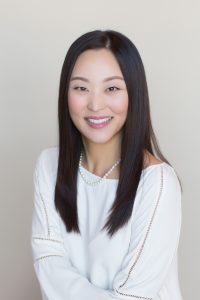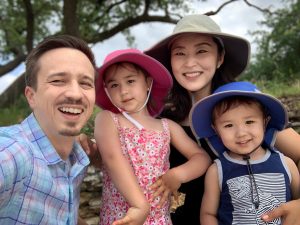Summer has just started and it is already almost 100 degrees here in Katy. And, that sun is HOT. And, that sun becomes a daily concern as we head with our families to the pool, splash pad, playground, beach – how do we keep our skin safe? How do we choose a sunscreen? And, now, are chemical suncreens even safe? So, this month’s “Ask the Expert” is all about Skin Cancer Awareness and its implications for our mama audience. We gathered experts from different specialties that deal with many aspects of skin cancer, all the way from prevention, diagnosis, and treatment.

Dr. Suzie Chang

Dr. Connie Wang
Meet our expert panel composed of two local female physicians: Dr. Suzie Chang of Katy Plastic & Reconstructive Surgery, and Dr. Connie Wang of Elite Dermatology.
KMN Q: Doctors, thank you for returning to our panel. For new members of our audience, please tell us a little bit about yourselves.
Dr. Chang: “I am a board-certified plastic surgeon with specialization in cosmetic and oculoplastic surgery. I live in Katy with my husband and my two kids. My practice, Katy Plastic & Reconstructive Surgery, is located inside the Memorial Hermann Katy hospital campus, on I-10 and 99. Our family loves living in Katy – and are especially looking forward to this summer season!”
Dr. Wang: “I am a board-certified dermatologist. In my practice, Elite Dermatology, I see a variety of children, adults, medical, surgical and cosmetic cases. I am a Houston native, and I really enjoy serving the Katy community!
KMN Q: Tell us a little bit about Skin Cancer.
Dr. Wang: “Skin cancer is the most common type of cancer in the United States. Here’s a daunting statistic: one out of every five Americans will develop skin cancer at least once in their lifetime. Some forms of skin cancer can spread to other parts of the body and can even be deadly. Most skin cancer is directly related to the amount of unprotected sun exposure that you have accumulated over the years – especially those bad sunburns you got in childhood.
Put very simply, unprotected sun exposure leads to skin cancer.”
KMN Q: How can we prevent skin cancer?
Dr. Chang: “In modern medicine, the best medicine for any disease is prevention. By making small changes to your lifestyle, you can prevent all of the negative repercussions of a skin cancer diagnosis – the stress, the pain, the costs, the scars. My practice focuses on this philosophy of Preventative Maintenance – to utilize prevention to maintain your good health/appearance for as long as possible.
In order to prevent skin cancer, we should all be wearing a daily broad spectrum sunscreen of SPF 30+ that is appropriate for your daily activities – 365 days a year! Personally, I use a Korean brand cushion-applicator CC cream with built-in SPF 50 as part of my daily makeup routine. Besides sunscreen use, you can also block those harmful UV rays with clothing and accessories. Wear a brimmed hat that will protect your scalp and your face. And don’t neglect your eyes – choose sunglasses with large lenses that block both UVB and UVA rays. For our fashion conscientious readers, make your fashion choices work for you in this way! ”
Dr. Wang: “I love Dr. Chang’s tip about sun-protective clothing and accessories! It’s difficult to apply and reapply sunscreen perfectly, so protective clothing and accessories are key! I’d also add that the sun’s rays are strongest between 10am – 3pm, so try to seek shade as much as possible during this time.
A lot of my patients ask me if the sunscreen in their makeup is enough. In general – No. Most makeup contains SPF 10 or 15. There are great formulations for facial sunscreens now that do not feel heavy under makeup. My favorite is EltaMD UV Daily Tinted, which doubles as a moisturizer! You can also add an oral daily antioxidant, Heliocare, to reduce the damaging effects of UV. And of course no tanning beds!
KMN Q: How do you treat skin cancer in your specialty?
Dr. Wang: “Dermatologists are usually the first-line in skin cancer detection. I cannot emphasize enough the importance of a full skin exam. If you have a history of skin cancer or are at risk for developing skin cancer – your skin needs to be checked annually or more frequently. As a board-certified dermatologist, I have spent over 16,000 hours in training studying the skin. A large part of that is learning to detect skin cancer from a benign lesion. If a lesion is suspected as skin cancer, I will perform a biopsy. If confirmed to be cancerous, a surgical procedure is usually required to completely remove the lesion.
There is no national guideline for when to start skin checks, but I think age 20 is a good time to get a baseline check. If there is a family history of skin cancer or tanning bed use, you may need to start earlier, such as in your teens. Then the dermatologist can make individual recommendations as to how often a person needs a full skin exam based on individual risk factors, including skin type, history of sun exposure and family history. Self-skin checks are also important -a lot of melanomas are self-detected!“
Dr. Chang: “As Dr. Wang mentioned, the incidence of skin cancer among the general population is high – 1 in 5! Wow! As a plastic surgeon, I deal with skin cancer from making the diagnosis, cancer resection (surgical removal), cancer reconstruction (closing the hole in the most cosmetically pleasing way possible), all the way to scar therapy (treatments to make an unattractive scar look better). I have specialized and advanced fellowship training in dealing with reconstruction after Mohs surgery (specialized surgery for skin cancer removal) – especially of the eyelids.
However, my practice typically handles another well-known negative repercussion from too much sun-exposure – Accelerated Photoaging. Our patients come in with signs of advanced aging from a lifetime of unprotected sun exposure. While minimally-invasive options are good for early aging, advanced aging is most effectively treated with surgical options. So make sure you apply that sunscreen for both skin cancer prevention AND wrinkle reduction. No one ever regrets putting on too much sunscreen!”
KMN Q: How should we choose a sunscreen?
Dr. Chang: “There are physical and chemical sunscreen options available, each with their own unique advantages. Physical sunscreen sits on top of the skin and reflects the sun’s rays. The minerals titanium dioxide and zinc oxide are the main active ingredients in physical blocks. Physical sunblock tends to be less irritating and a better fit for sensitive skin. Although it is more moisturizing, some find it feels heavy on the skin as they are more difficult to fully blend into the skin. Because of this, physical sunscreens are available in matte and tinted versions, and can compliment anyone’s beauty routine. Conversely, chemical sunscreens absorb into the skin, which then absorbs UV rays, converting the rays into heat, and releasing them from the body. Active ingredients in chemical sunscreens include: avobenzone, octinoxate and oxybenzone. Because chemical sunscreens absorb quickly into the skin and have a water-resistant formulation, this makes them great for water activities or for physical activities where sweating is expected. We carry both options at our practice to fulfill a variety of patient needs.”
Dr. Wang: “The hot new topic surrounding sunscreens right now is about the absorption of chemicals from sunscreens into the bloodstream. An article published earlier this month revealed detectable levels of avobenzone, oxybenzone, octocrylene, and ecamsule were found in the bloodstream following regular sunscreen application.
(https://jamanetwork.com/journals/jama/fullarticle/2733085?guestAccessKey=e1ad4492-fe70-4f53-970d-d63bfa1cdccd&utm_source=For_The_Media&utm_medium=referral&utm_campaign=ftm_links&utm_content=tfl&utm_term=05062019)
KMN Q: Does this mean chemical sunscreens are unsafe?
Dr. Wang: “No. We do not yet know the significance of these findings. Although these ingredients are being absorbed into the bloodstream, it does not mean they are necessarily toxic or carcinogenic. The FDA is actively requesting more safety data, so stay tuned.”
KMN Q: Does this mean I should stop using sunscreen?
Dr. Wang: “No. The sun is a known carcinogen. Particularly for those people with fair complexion or a history of skin cancer, the effects of UV exposure is quite deleterious. The recommendation of the FDA and the American Academy Dermatology is to continue to use sunscreen. Physical sunscreens (zinc and titanium) are deemed safe. However, physical sunscreens are less water resistant than their chemical counterparts.”
KMN Q: What kind of sunscreen should we use on our children?
Dr. Chang: “As a mother and a physician, I often get asked the question – which sunscreen is best for our children? My answer is one that we live by in our own household:
The best sunscreen is one that actually gets put on our children!
We all know how difficult it is to properly apply anything on our children when they’re so excited to play! Some tips and practical mommy-hacks from our household include:
● Wearing swimwear with built-in UPF (ultraviolet protection factor). E.g. long-sleeve/one-piece swimsuits
● Wearing water hats that have big brims and neck drapes E.g. one of our favorites – “Sunday Afternoons” hats with built-in breakaway chin-straps
● Use quick-to-apply brush-on mineral sunscreens that do not require rubbing in for the especially wiggly toddler!
● Keep sunscreen readily accessible and within reach. We keep stashes everywhere: in our car, my purse, in each swim bag, in the house, and in our kids’ go-bags!
In general, we tend to prefer physical sunscreens over chemical. But – again, the best sunscreen is the one that actually gets used!”
Dr. Wang: Some final thoughts on sunscreen application:
● You should look for SPF 30 or above
● You should look for broad-spectrum (UVA and UVB) protection
● You should look for water-resistant up to 80 minutes
● You should apply a quarter-sized amount of sunscreen to cover your face
● You need to apply 1 shot-glass full of sunscreen to cover your entire body.
● You should also reapply every 2 hours while outdoors.”
—————————————————————————————————————————————-
In summary, our KMN followers should remember:
● 1 in 5 Americans get diagnosed with skin cancer in their lifetime.
● Schedule annual dermatology checkups!
● Be sunsafe: Wear sunscreen daily, 365 days a year!
● Choose a suncreen that is right for your daily activities!
● Protecting your skin is essential for skin cancer prevention and premature
aging!
We would like to thank all of our wonderful Katy Mom Physicians for the jobs that they perform and the excellent care that they provide for all of their patients.
To learn more about our panel physicians:
Check out Dr. Chang’s Meet a Mom interview here and Dr. Wang’s Wellness Wednesday Interview here!

